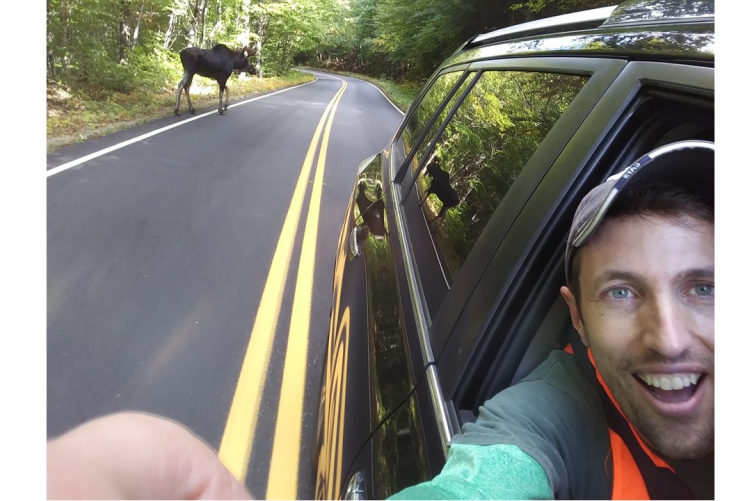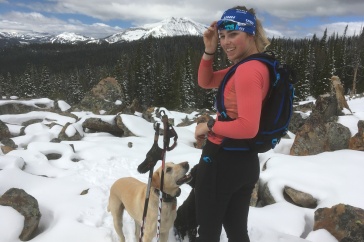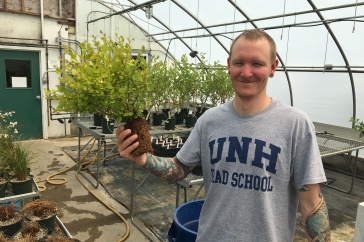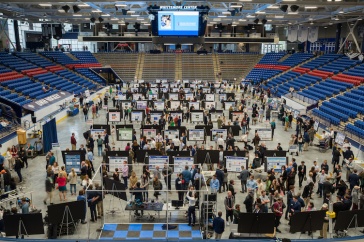
Assistant Professor Rem Moll captures his first moose sighting in Barlett Experimental Forest
Life might have been very different for Remington (Rem) Moll, assistant professor in the department of natural resources and the environment, if a leg injury suffered in his junior year of college hadn’t derailed his plans to become a professional athlete.
But fortunately, Moll — who, along with his brother, was one of the first two people in his family to complete college — had already begun to discover both his love of wildlife ecology and the rewards of academic research, which together lit a path forward that he could continue to “run” on, one that would rely on his brain more than his legs to propel him forward.
COLSA: What is your current position? Can you give me a brief overview of what you do?
Rem Moll: I am an assistant professor of wildlife ecology and management. I've been at UNH since 2020, hired at the height of COVID. My research group and my teaching focuses on wildlife ecology. We mostly study terrestrial mammals including carnivores, foxes, bobcats, fisher and ungulates, which are large, hoofed mammals. White tailed deer and moose are the big species there.
We do a lot of work on population ecology, figuring out how many animals are out there and what drives variation in their population sizes and distribution. A lot of these species are managed, and our work informs management as well. Another area that we work in is urban ecology: how developed landscapes impact wildlife and how humans affect wildlife in different ways.

COLSA: What motivates you to do what you do?
Rem: I approach work and life from a position of almost like a calling. I would call myself a person of faith in the Christian tradition, and so I view a job as something that has a deeper meaning or deeper purpose to it. Relating that to my work here, I think a lot about the earth that we live on and all the amazing natural beauty and creatures that are on it. And I feel a sense of responsibility or stewardship or care for those things.
COLSA: What would you say are the goals that you most want to accomplish in your work?
Rem: I think there's a lot of value in doing things well. I try to embrace the process of creating knowledge, discovering things and telling people about them and helping students learn about topics that are of interest to them and important to their world.
COLSA: What do you like most about your job?
Rem: The moment I like the most is after planning and thinking and researching and collecting data, collaborating other people and working with students, after all of that work, the data comes in, and we sit down to analyze it. Once the analysis is done and you see the results, you have either answered the question or you've caused a new one — that moment of discovery motivates me a lot.
I also deeply value the mentor-mentee relationship with students and working with collaborative partners.
COLSA: How would you like to be remembered?
Rem: If my children think of me with fondness, I think I will have accomplished what I wanted to accomplish.
COLSA: When did you first know you wanted to pursue a career in research and or teaching?
Rem: When I was in college [at the University of Missouri], I was mostly thinking about sports. When I chose a major, I looked through the course catalog, which back in my day was a physical book, and I chose a major that had the coolest sounding courses, which were wildlife, fisheries and wildlife, ornithology, ecology, outdoor things, dendrology (the study of trees).
When I was badly injured during my junior year, I applied for an additional year to compete in track because of the injury.
At the same time, I was working with a professor as an undergraduate, and I stayed on with him to do a master's degree. That’s when I realized that the process of formally researching, writing, collecting data, analyzing data and seeing it through to publication was very satisfying to me and something that really clicked.
COLSA: When you accepted the job at UNH, were there things about coming to this area that attracted you?
Rem: Absolutely. New Hampshire is, in many ways, an ideal place for my job. The wildlife community here is quite interesting. We have a lot of black bears, bobcat, fisher, gray fox, red fox and coyote. There’s a lot of interactions between those species that I'm really interested in. It's also a great place to look at how humans impact wild areas.
The university’s land grant mission also resonates with me. Doing research where you are is great. Being able to have study sites in College Woods and work across New Hampshire is amazing.
The other thing I'll mention is I think UNH is an ideal place to be a professor because we have a great balance of research and teaching. People here really care about teaching. And I've been in some bigger universities and sometimes teaching is less emphasized, but here it's a nice mix. We have world class researchers and dedicated educators. You get the best of both.
COLSA: Where did you grow up and what was it like to grow up there?
Rem: I was born in Wisconsin, but I grew up mostly in the Tulsa, Oklahoma suburbs. My family was, interestingly, not particularly outdoorsy. So that was something I discovered a little later in life.

COLSA: Tell me about your mother and father. What were they like?
Rem: My dad is the embodiment of an entrepreneurial spirit. He's very gregarious, very outgoing. He’s active. There's like a level of restlessness to him. He's always doing something. He's spent most of his life in the radio world. He was a general manager of a radio station, and he owned a radio station at one point. I'm much more reserved than him. But I think some of the entrepreneurial creativity, maybe, I inherited from him.
My mother is just a wonderful, caring, compassionate, hardworking person. She loves animals and nature. She wrote a couple of children's books and self-published them after she retired from other work, and my daughter is reading one right now, which is really cool.
COLSA: Do you have any key mentors or people who deeply influenced who you are, what you believe in and what you're committed to in your work and life?
Rem: My master's mentor, Josh Millspaugh at the University of Missouri, and my PhD advisor, Bob Montgomery at Michigan State, were inspiring mentors that shaped a lot of my professional aspirations. Also, the lead pastor of the church we went to in Missouri, Phil Schaefer. He was just full of wisdom — widely educated, widely read — and drew upon a lot of life experience. My wife and I moved overseas for a while, and our decision to do that was really impacted by his advice, and it changed the course of my life.
And then there was a mentor that I had in Michigan, Peter Hoffman, who was a colleague and a friend. He is an instructor of English at Michigan State where I did my PhD. We were there without family, and he and his wife Renee kind of adopted us. They have 12 kids and are parents to the world.
COLSA: Let's talk about the time you spent abroad. Where did you go?
Rem: My wife and I had some connections to a faith-based NGO in Lebanon, the Lebanese Society for Educational and Social Development. After I received my master’s degree, we were invited to partner with them, and I became a high school teacher in Beirut. This was from 2009 to 2014. We had two children during that time. We learned Arabic. We spent some time in Jordan, as well. I also worked a bit for the Royal Society for the Conservation of Nature in Amman, Jordan. We had our first daughter in Amman, and our second child was born in Beirut, Lebanon. Both really good experiences.
Since then, I've done a fair amount of international research. I've been a part of research on Persian leopards in Iran, pine martens in Scotland, African lions in South Africa. I only do that type of work if I'm invited into it by people who are in those places. I view my role as someone who could come alongside and augment what's already happening.
I’m currently working with a collaborator in Brazil who is leading an urban project examining how mammals there are using telephone and power lines to travel between natural habitats.

COLSA: Did you have any life changing experiences that put you on the path that led you to what you're doing today?
Rem: I think it was the leg injury I experienced in college. That's probably the pivotal moment that changed my long-term career ambitions. Whether or not I was delusional, my hope was to see how far I could get in the athletics world and put the rest of life on hold until I did. The injury ended that for me, and then I really started getting into research.
COLSA: What do you do in your spare time?
Rem: Things outside — hiking, fishing and hunting. Anything that involves games — lawn games, frisbee golf, party games, tabletop role playing games. During COVID, I started playing Dungeons and Dragons with my kids. I also enjoy birdwatching. My kids are very into ballet. So, that's also a big part of our lives. I also like music and playing guitar.
COLSA: Who do you like to listen to?
Rem: I can give you my top five: Sigur Rós, which is an Icelandic band, Radiohead, Beach House, Sufjan Stevens and Bon Iver.
COLSA: What is your favorite book, and what is your favorite movie?
Rem: My favorite book is The Brothers Karamazov by Dostoevsky. It’s a murder mystery basically, but it has a little bit of everything, it wrestles with the deep questions of why we're here and whether God exists. I have two favorite movies — Shawshank Redemption and No Country for Old Men.
COLSA: If you could be or do anything else, what would it be?
Rem: A musician, but I don't have the talent. More realistically, I think I would pursue a career in some kind of federal law enforcement, like the FBI. I think something that involved puzzle solving and working for a greater good would suit me. Also, I have a personality suited to high-pressure, high-intensity situations. I'm able to stay clear minded.
COLSA: If you could have dinner with five famous people, living or dead, who would they be?
Rem: Blaise Pascal, Simone Weil, Jesus, John Wooden and my wife, because I would want someone to experience that with me. I was talking to her about it, and she said you must have someone to properly debrief with because those interactions would be amazing.
COLSA: What one word would you use to describe yourself?
Rem: Curious.
COLSA: So, to date, what are you most proud of?
Rem: I'm most proud of having a family and kids.
COLSA: What's one thing about you that few people know?
Rem: I'm fluent in Arabic.
COLSA: Last question. What has been the happiest day of your life?
Rem: My wedding. It was a winter wedding in Oklahoma. We had this great reception on a lake, and we happened to luck out with the weather. All my favorite people were in the same place. It was a great, great day.
-
Written By:
Sarah Schaier | College of Life Sciences and Agriculture

















































